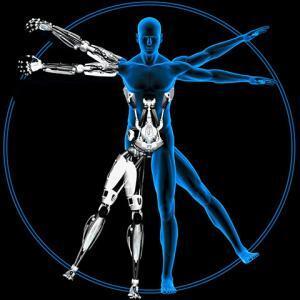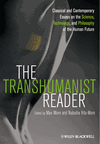“Transhumanism is a philosophical and intellectual movement which advocates the enhancement of the human condition by developing and making widely available sophisticated technologies that can greatly enhance longevity and cognition.”
“Transhumanist thinkers study the potential benefits and dangers of emerging technologies that could overcome fundamental human limitations, as well as the ethics of using such technologies.”
“Some transhumanists believe that human beings may eventually be able to transform themselves into beings with abilities so greatly expanded from the current condition as to merit the label of posthuman beings.”
“Another topic of transhumanist research is how to protect humanity against existential risks, such as nuclear war or asteroid collision.” ~ Wikipedia
As “anti-human” as it may all seem, perhaps Transhumanism will become the discovery that saves us all. As companies that manufacture bionic devices have proved, not all ideologies behind Transhumanism are scary. People who thought they would never be able to walk again are being given a newfound opportunity to regain their freedom.
Biological evolution takes place over generations. But imagine if it could be expedited beyond the incremental change envisaged by Darwin to a matter of individual experience. Such things are dreamt of by so-called “transhumanists”.
Transhumanism has come to connote different things to different people, from a belief system to a cultural movement, a field of study to a technological fantasy. You can’t get a degree in transhumanism, but you can subscribe to it, invest in it, research its actors, and act on its tenets.

The term “transhumanism” gained widespread currency in 1990, following its formal inauguration by Max More, the CEO of Alcor Life Extension Foundation. It refers to an optimistic belief in the enhancement of the human condition through technology in all its forms. Its advocates believe in fundamentally enhancing the human condition through applied reason and a corporeal embrace of new technologies.
It is rooted in the belief that humans can and will be enhanced by the genetic engineering and information technology of today, as well as anticipated advances, such as bioengineering, artificial intelligence, and molecular nanotechnology. The result is an iteration of Homo sapiens enhanced or augmented, but still fundamentally human.
 The first authoritative and comprehensive survey of the origins and current state of transhumanist thinking. The rapid pace of emerging technologies is playing an increasingly important role in overcoming fundamental human limitations.
The first authoritative and comprehensive survey of the origins and current state of transhumanist thinking. The rapid pace of emerging technologies is playing an increasingly important role in overcoming fundamental human limitations.
Featuring core writings by seminal thinkers in the speculative possibilities of the posthuman condition, essays address key philosophical arguments for and against human enhancement, explore the inevitability of life extension, and consider possible solutions to the growing issues of social and ethical implications and concerns.
Edited by the internationally acclaimed founders of the philosophy and social movement of transhumanism, The Transhumanist Reader is an indispensable guide to our current state of knowledge of the quest to expand the frontiers of human nature.
